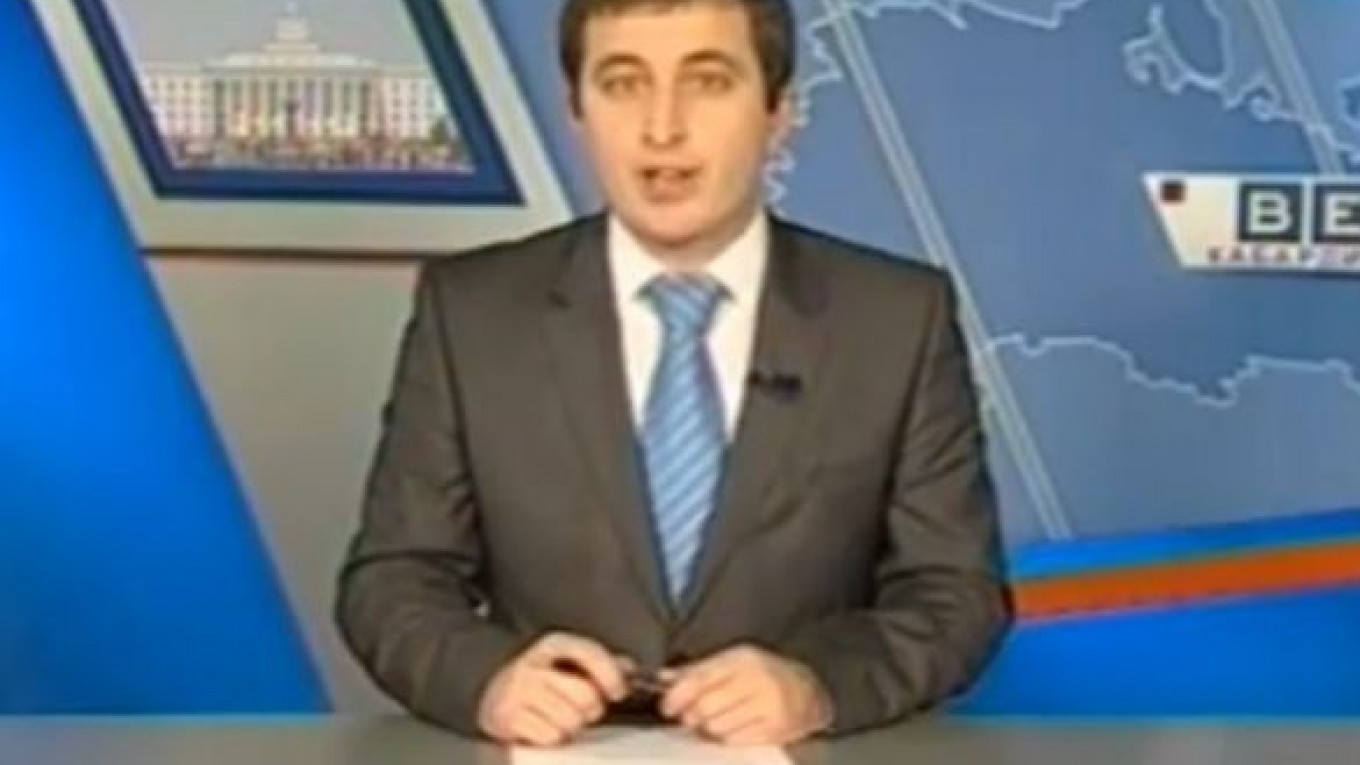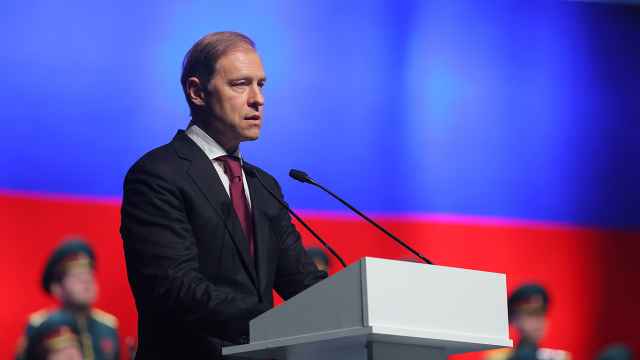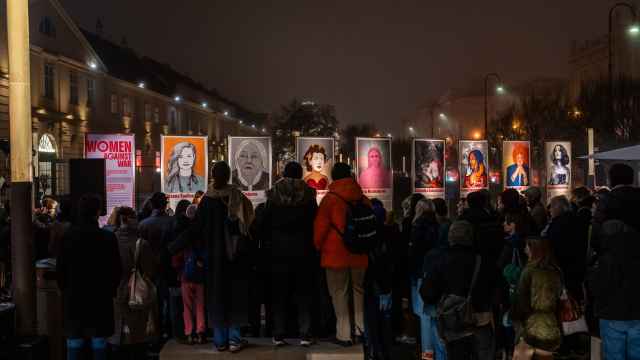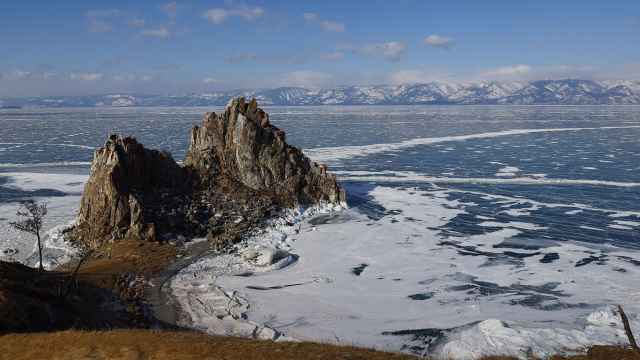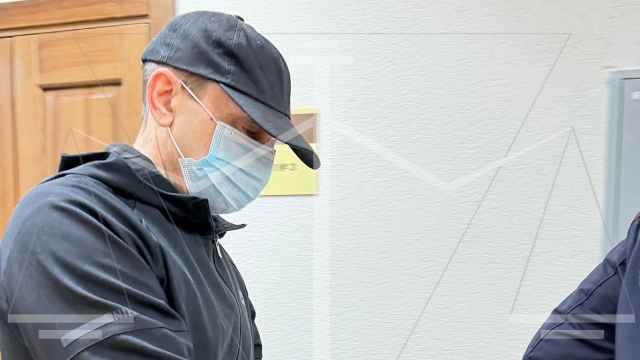A popular local TV anchor was shot dead in the North Caucasus republic of Kabardino-Balkaria late Wednesday in what investigators and observers interpreted as a warning to the journalist's bosses not to give news coverage to authorities' fight against local rebels.
In a separate attack, a deputy transportation minister for the republic was hospitalized in Nalchik on Thursday morning after his car exploded as he was leaving his home. The official, Vladislav Dyadchenko, was hospitalized with non-life-threatening injuries.
Investigators said they suspect the killing of Kazbek Gekkiyev, 28, an anchor for the evening news show Vesti KBR, was linked to his job.
Vesti KBR is the local edition of a national news show of the same name, aired on Rossia 1 television, which is broadcast by the state-run VGTRK media holding.
Gekkiyev is the first journalist to have been killed in Russia this year because of his job or while on assignment, according to data compiled by the International Press Institute, maintaining a streak of more than 15 years in which at least one journalist was killed in the country each year.
He is also the latest journalist to have been killed in the turbulent North Caucasus, where a number of high-profile killings of journalists have occurred in recent years.
The anchor was shot in the head by an unidentified gunman outside the TV office in Nalchik at around 9 p.m. on Wednesday, the Investigative Committee said in a .
Gekkiyev was talking with a female friend near his office when two unidentified men came out of a nearby car and approached him, Vesti television reported, citing unidentified relatives of the victim. The woman thought the men were Gekkiyev's friends and walked a few meters away to let them talk.
The men asked the journalist whether he was the television anchor Kazbek Gekkiyev, and when Gekkiyev replied that he was, they fired at him, according to the .
He died at the scene, investigators said.
it views the crime as "a threat to other journalists who tell about the results of the fight [of authorities] with the bandit underground functioning in the republic."
Before shooting Gekkiyev, his attackers made sure he was an anchor of a news program, which "confirms the priority lead" in the probe, the committee said.
Violence is endemic in the republics of the North Caucasus, and there have been several killings of journalists in the region in recent years.
Last December, a masked attacker shot dead Khadzhimurad Kamalov, founder of the opposition-leaning Dagestan newspaper Chernovik.
In July 2009, the body of journalist and human rights activist Natalya Estemirova was discovered in Ingushetia with gunshot wounds after she was abducted earlier in Chechnya. In 2008, there were at least three beatings and two murders of journalists in Dagestan alone.
According to data compiled by the International Press Institute, the number of journalists killed because of their work or while on assignment in Russia has fluctuated over the last 15 years, with the worst year being 1999, when 12 journalists were killed. IPI has information on journalist killings dating back to 1997.
In rankings for 2012, Russia was not ranked among the most dangerous countries for journalists, with Gekkiyev being the only one killed this year. In 2011, Russia was ranked the sixth-most dangerous out of 40 nations, with 3 journalists killed.
Other anchors of the Kabardino-Balkaria VGTRK channel received threats from local rebels in February because of a report about the "successful destruction" of a rebel group last year, said Lyudmila Kazancheva, head of the local VGTRK office.
In a video address posted on YouTube, the rebels threatened several anchors of the channel, Kazancheva said, declining to provide the anchors' names out of fear for their safety.
Kazancheva said she and her subordinates presumed that previous threats to their other anchors were linked to Gekkiyev's slaying because he "had no enemies."
that the rebels in the YouTube video demanded that the anchors they named be taken off the air, and Gekkiyev was one of their replacements.
Zhanna Gulyayeva, head of the news desk at the local VGTRK office, said Gekkiyev "hadn't covered any sensitive issues or crime" in almost three years of working for the local channel.
Gekkiyev reported about low-profile social issues like "the inconvenience of speed bumps" on local roads, or unusual news like a report about a man who built a bus, Gulyayeva said.
Kazancheva said that Gekkiyev was popular with viewers as a "maestro of beautiful stand-ups," a term for on-scene reports.
Rebels are blamed by authorities for much of the almost daily violence in the North Caucasus, where a separatist movement is seeking to carve out an Islamic state.
The gun battles with law enforcement and attacks on state officials are most common in the republics of Dagestan and Ingushetia. But there are also attacks in Chechnya, where two wars were fought in the early 1990s and 2000s, and in other republics including in Kabardino-Balkaria, which is tucked between Karachaeyeva-Cherkessia to the west and North Ossetia to the east.
Authorities say the movement is fed by poverty and low employment rates, while activists say rebels are also motivated by ill treatment of the population by local law enforcement.
Alexei Malashenko, an Islam expert with the Carnegie Moscow Center, said the standoff between rebels and authorities in Kabardino-Balkaria has grown worse in the past 10 years.
"It is symbolic that a blow was dealt to a public person and it is meant to say that if you talk about us, Islamic radicals, you will be punished," Malashenko said.
"It is a defiant act that says 'We fear nothing,'" he said.
The republic's president, Arsen Kanokov, expressed on his official website. "The criminals deserve the gravest punishment," he said. "To solve this crime is a matter of honor for law enforcement structures."
Locals suspect that Wahhabis ordered the murder of Gekkiyev to "warn someone from VGTRK," said Mukhamed Khafitse, head of Adyghe Khase, a Nalchik-based non-governmental organization and member of the International Circassian Association.
Khafitse knew Gekkiyev personally and attended his funeral at a local village Thursday. About 500 people came to the funeral, including national VGTRK head Oleg Dobrodeyev, .
"I can only guess that they [the masterminds of the attack] wanted publicity and they got it," said Gulyayeva, the head of the news desk at the local VGTRK channel.
Asked whether she would change the coverage at her channel because of Gekkiyev's murder, Kazancheva said her reporters would "keep fulfilling their professional duties" but that she would not allow them to "look for trouble."
"No report is worth a human life," Kazancheva said.
Related articles:
A Message from The Moscow Times:
Dear readers,
We are facing unprecedented challenges. Russia's Prosecutor General's Office has designated The Moscow Times as an "undesirable" organization, criminalizing our work and putting our staff at risk of prosecution. This follows our earlier unjust labeling as a "foreign agent."
These actions are direct attempts to silence independent journalism in Russia. The authorities claim our work "discredits the decisions of the Russian leadership." We see things differently: we strive to provide accurate, unbiased reporting on Russia.
We, the journalists of The Moscow Times, refuse to be silenced. But to continue our work, we need your help.
Your support, no matter how small, makes a world of difference. If you can, please support us monthly starting from just $2. It's quick to set up, and every contribution makes a significant impact.
By supporting The Moscow Times, you're defending open, independent journalism in the face of repression. Thank you for standing with us.
Remind me later.


